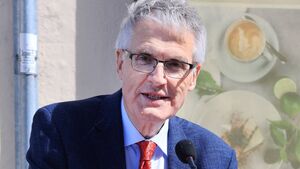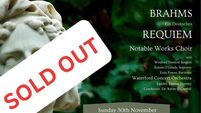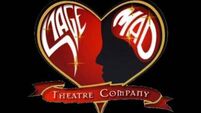View from the Green Room: Eugene’s men’s shed for Urbs Intacta history scholars

Dr. Eugene Broderick’s museum talks on the history of Ireland in the 20th century have been running since 2016.
Dr. Eugene Broderick’s museum talks on the history of Ireland in the 20th century have been running since 2016 and it’s handshakes, hugs and air kisses all around as the new season kicks off. There’s been 17 series of spring and autumn lectures, and there are people here today that have attended all 17. Why? …because Wednesday, in the Museum of Treasures, is like a historian’s version of the men’s shed for history scholars of the Déise.
Everyone knows Eugene and they’re all mad about his infectious enthusiasm for sharing his knowledge of the political goings-on of the last century. What could be more interesting than a story that we all shared in, with personal first-hand engagement of the lived experience of the last several generations?
Some referees blow whistles when they want to commence engagements. With Eugene it’s "can ye all hear me?" and the full floor of the Garden Room assures him of their immediate attention. It’s why they’re all here, after all.
Eugene loves the drama of it all. He’s got that goldfish fin of pride we all feel when we find we’ve got everyone’s interest.
When he describes the story behind the Good Friday Agreement, words like "fascinating…riveting…remarkable…extraordinary" tumble around like drum of a washing machine on a slow cycle.
When Broderick references Tony Blair’s summary that the Good Friday Agreement process would serve as a model for achieving resolution to any protracted and involved political impasse in the world, there’s that lean-forward-fear-of-missing-something experience.
Context is everything and today is all about context. Blair and Bertie were also quick to mention the actors along the way that paved the path to Good Friday – Albert Reynolds, John Major, Redemptorist Fr. Alex Reid, much-maligned Northern Secretary Peter Brooke, and, the subject of today’s lecture, John Bruton.
When context is mentioned, we find ourselves back in the John Redmond days where some of the audience – myself included – would have generational recollections of parents who worshipped John Redmond and his son Capt. Willie and supported them through thick and thin. And those who didn’t.
Today’s subject, Taoiseach John Bruton from 1994-97, was Fine Gael royalty. Wealthy farmer and well-educated with a deep connection with Garrett Fitzgerald’s Just Society, Bruton admired John Redmond as a constitutional politician of great courage and conviction, whose word was his bond and who abhorred violence.
But… Bruton knew the lie of the land. The Provisional IRA had come to recognise that while they could continue the armed struggle indefinitely it was getting them nowhere. Shiploads of Gaddafi guns were never going to bomb Unionists into a 32-county republic. 25 years of violence and three and a half thousand deaths had really achieved nothing other than deepening the gulf between nationalists and unionists. The time, to quote Seán O'Casey, was "rotten, ripe for revolution". True revolution.
Positions were mapped out. No talks without Sinn Féin involvement…talks could not commence without a ceasefire…a Downing Street declaration would match a ceasefire… a different type of solution had to be imagined. It’s game on.
The Broderick Talks continue each Wednesday lunchtime at the Museum of Treasures for the month of October.






